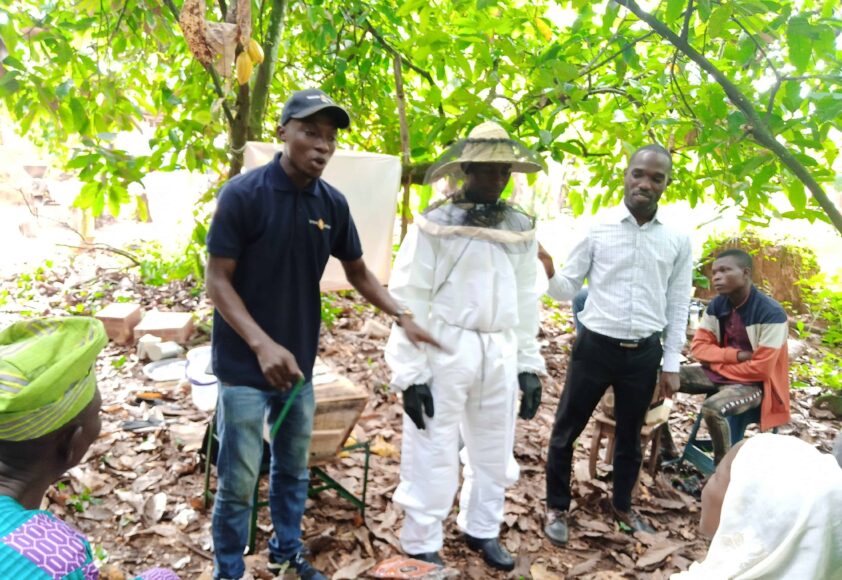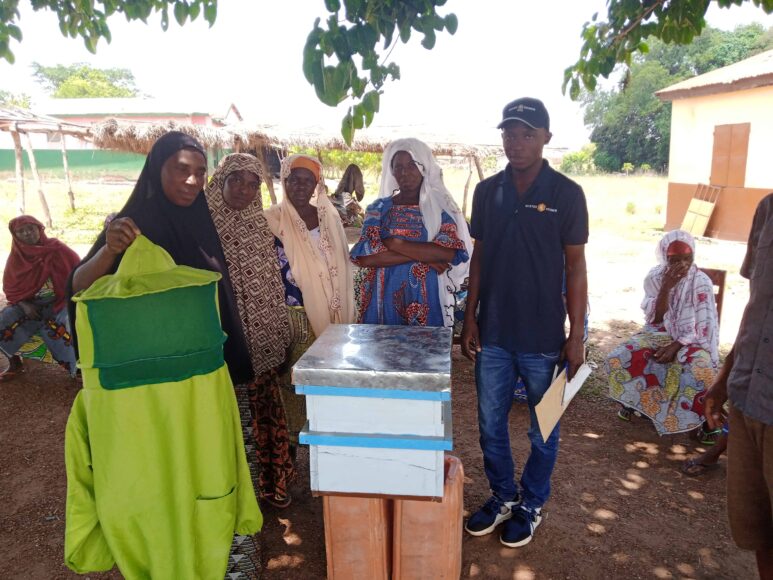La empresa de ceras naturales. Koster Keunen está a punto de establecer la primera organización organizada de África Occidental, Línea de suministro regional de pequeños apicultores., produciendo cera y miel orgánicas que cumplen con los estándares internacionales.
Recibir un $1.7 Subvención de millones a través de EE. UU.. Agencia para el Desarrollo Internacional Centro de Comercio e Inversión de África Occidental, la empresa togolesa equipará con suministros apícolas a agricultores de seis países de la región, Proporcionar capacitación y orientación para la certificación orgánica y establecer vínculos de mercado para la cera de los pequeños agricultores., productos de miel y anacardos.
“Nuestro trabajo no es sólo producir y comercializar cera de abejas, es brindar seguridad a nuestro cliente en términos de calidad y en términos de información en torno a los tres pilares de la sostenibilidad.: económico, impacto social y ambiental," dice Sylvain Cattin, Director General de Koster Keunen para África Occidental.
El Trade Hub es uno de los mecanismos de subvenciones más grandes de USAID y tiene como objetivo abordar algunos de los mayores desafíos de desarrollo de la región., como el empoderamiento de las mujeres, creación de empleo y seguridad alimentaria, desbloqueando capital privado y dirigiéndolo a proyectos de alto impacto. La empresa de apicultura y cera de Koster Keunen es una de sus primeras beneficiarias. Koster Keunen África Occidental está trabajando con Asociación para ingredientes naturales, un Estados Unidos. Empresa con sede que alinea recursos públicos y privados para ampliar el abastecimiento sostenible en las industrias alimentaria y cosmética..
“A través de la asociación de programas empresariales y de desarrollo, Podemos trabajar a la escala requerida y abordar los desafíos multifacéticos para establecer cadenas de suministro sostenibles.," dice José Funt, Líder de la estrategia de múltiples partes interesadas en Partnership for Natural Ingredients. "Estamos entusiasmados con la asociación entre Koster Keunen y Trade Hub y creemos que puede ser un modelo en la región".
El acuerdo del Trade Hub con Koster Keunen apoya directamente a Prosper Africa, un Estados Unidos. Iniciativa gubernamental para incrementar el comercio entre los continentes.. Trayendo toda la gama de EE. UU.. Recursos gubernamentales, Prosper Africa conecta a EE. UU.. y empresas africanas con nuevos compradores, proveedores, y oportunidades de inversión. El proyecto apícola de Koster Keunen está financiado a través del Trade Hub de Prosper Africa y sus exportaciones se destinarán a EE.UU.. compradores.

La apicultura requiere habilidades especializadas y elevados costos iniciales. In addition to trainings on how to safely steward hives and harvest from them, the Trade Hub’s grant will allow Koster Keunen to purchase and distribute an initial 36,000 bee boxes, safety suits and smokers. The firm is committed to strengthening local businesses at each point of the process, with local carpenters in each country contracted to produce the boxes.
“We want to have a long-term commitment to the beekeeper and to show them that this is an activity that can be professional, and they can make good income,” says Cattin. “But to do it the right way… to respect the environment, the bee colony.”
Over the life of the project, Koster Keunen plans to equip over 11,200 beekeepers in multiple countries across the region, conectar un suministro sostenible de producto con los mercados internacionales de Europa y Estados Unidos.
“Porque nuestros socios como Koster Keunen trabajan en comunidades extremadamente frágiles, para el Centro Comercial, Es imperativo que nuestros inversores coloquen a las personas en el centro de sus planes de negocio.," dice Jim Winkler, Vicepresidente de la división de Crecimiento Económico de Creative. "Esto nos da aún más incentivos para trabajar con empresas serias y comprometidas a generar cambios serios".
A diferencia de la producción comercial de miel, donde las empresas pueden depender de enormes colmenas y cosecha mecanizada., La producción de cera se adapta mejor a un modelo de cultivo de pequeños propietarios.. Gestionar la urticaria para obtener cera tiene más sentido comercial, Garantizar que este proyecto sea sostenible más allá de la vida de la subvención..
Koster Keunen también apuesta por la trazabilidad y la calidad. Cada vez más consumidores, ya sean compradores individuales o grandes empresas, exigen transparencia en sus ingredientes de origen.
Relaciones simbióticas: de la colmena al consumidor
Creando equidad, Las relaciones sostenibles con los pequeños productores han sido identificadas como una de las piezas clave del rompecabezas para superar los desafíos globales de la pobreza., Inseguridad alimentaria y desigualdad de ingresos..
La apicultura puede aumentar los ingresos de los pequeños agricultores africanos al 10-20 veces, dándoles otra forma de diversificar sus ganancias. Porque Koster Keunen colaborará con colectivos establecidos de agricultores de karité y anacardos., Tener poblaciones saludables de polinizadores también puede aumentar significativamente el rendimiento de otros cultivos..
“Instalar dos cajas de abejas en una hectárea de anacardos puede aumentar el rendimiento de los anacardos al menos 50 por ciento debido al servicio de polinización,” says Cattin.
Cattin dice que si bien el cultivo del karité es estacional, La apicultura puede ser una actividad que se realice durante todo el año y que tenga el potencial de generar ingresos más estables para los apicultores..
Un objetivo importante del Trade Hub es garantizar que este tipo de potencial de crecimiento para los pequeños agricultores se traduzca en oportunidades para las mujeres., especialmente en las zonas rurales.
En la iniciativa apícola de Koster Keunen, al menos 20 El porcentaje de pequeños agricultores capacitados y certificados serán mujeres.. Aunque en la región la apicultura se considera tradicionalmente una actividad dominada por los hombres, Trabajar a través de cooperativas de karité de mujeres establecidas le da a Koster Keunen acceso a un mercado sin explotar..
“Para nosotros también se trata de involucrar a los jóvenes, para que no sólo se beneficien las generaciones mayores,” says Cattin.

Cattin dice que Koster Keunen espera utilizar su modelo de apicultura escalable como una forma de ofrecer oportunidades de ingresos alternativas a las comunidades rurales en una época en la que cada vez más jóvenes se ven obligados a migrar a las ciudades en busca de trabajo y servicios..
“Queremos… demostrar que es posible tener asociaciones muy sólidas, desde el apicultor en África Occidental hasta el cliente en Europa y EE.UU.. Queremos ofrecer el precio adecuado para garantizar una vida digna al agricultor”.